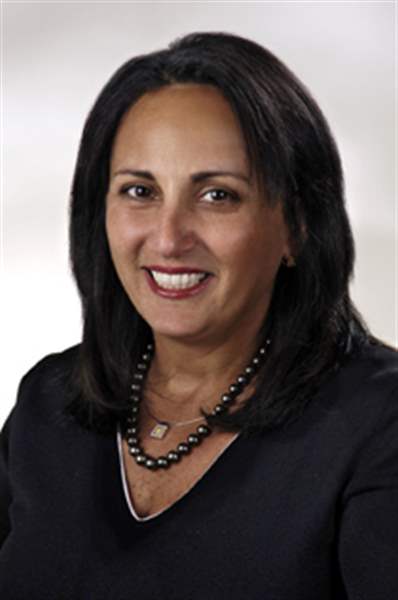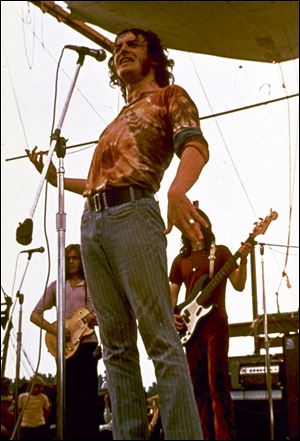
Hearing issues have baby boomers at a loss
More than third between ages 65-75 have reported decrease
7/22/2013
Dr. Randa Mansour-Shousher

Hearing loss in the baby boomer generation is partially attributed to loud music.
When baby boomers were coming along — blasting not only most traditions set by generations before them, but their music too — they probably didn’t think they might some day need hearing aids just to have a casual chat.
Now, with the eldest of the boomers this year turning 67, they are among the millions who need help hearing. And whether playing music too loudly in their younger years has anything to do with their hearing loss now is not as much of an issue as how hearing loss affects one’s lifestyle and the cost of hearing aids.

“With an aging population, we see more and more individuals having problems hearing,” said ProMedica ENT physician Dr. Allan Rubin. “Usually we see more women because they are more agreeable to seeing a doctor.”
The medical term for age-related hearing loss is presbycusis. While that is gradual, reports state that more than a third of those from 65 and 75 have some loss of hearing. About half of those in the 75-plus age group have some reduced hearing.
Dr. Rubin added, “We also see hearing loss as a result of secondary noise [coming from] factories, the military.”
And while other environmental factors add to the problem, the Centers for Disease Control and Prevention says that because 22 million people endure dangerous noise levels at work — annually costing employers $242 million in workman’s compensation disability claims — occupational hearing loss is the most common work-related injury.
Indeed, more than age and the environment are responsible for the inability to hear well. Heredity, illness, and the side effects of some medications are, too. Some children have hearing impairment at birth; others may develop it later. Dr. Rubin said that children born with hearing loss once had to learn to lip read. But the cochlear implant makes that less necessary.
Illness can cause hearing impairment. Helen Keller became blind and deaf after suffering from an illness as a toddler. And Dr. Rubin said conservative radio personality Rush Limbaugh lost hearing in both ears. There has been debate as to whether it was connected to his taking prescription pain medication.
Although people with hearing difficulties may be uncomfortable socially, the affects are more widespread. According to the U.S. National Health and Nutrition Examination Survey, some research suggests hearing loss may increase the risk of falling. Moreover, a Johns Hopkins School of Medicine finding reveals that the loss may add to decreasing mental abilities.
In a society getting increasingly older then, it’s no surprise hearing impaired consumers are wooed by those selling hearing aids, often for less than what’s recommended by doctors. That can make it tough for consumers whose insurance plans do not pay for the devices, which can cost thousands of dollars.

Dr. Randa Mansour-Shousher
Even so, audiologist Dr. Randa Mansour-Shousher urges people to have their hearing checked by audiologists. She said that though aids are expensive, they are worth it.
“An audiologist assesses the hearing and determines what type of hearing loss it is,” she said. “He does a medical determination and determines if anything else is going on.”
There are numerous types of hearing aid technology, which can drive costs. She said that anymore, aids are digital; the newer wireless ones connect to blue tooth technology. Some even adjust to the environment.
“If the phone rings, and you put the phone to one ear and the other ear adjusts,” she said. “The nice thing is that you are hearing in both ears.”
An audiologist also can assess the way a patient processes sound, which can differ from patient to patient. Audiologists also weigh patients’ lifestyles to determine the best type of hearing aid.
“Two people may have the same hearing loss but the way the nerve takes that information and sends it to the brain may be different,” she said. “We go through different technology and styles and help to select the right type of aid. Consumers must do their homework and have a good relationship with their doctor and audiologist.”
There is a trial period for hearing aids.
“I don’t know of any other medical device out there that you can try and return within a trial period,” she said. “Continued research carries a large portion of the cost. Aids are adjustable and carry a long warranty. Care and visits go into the cost of hearing aids. A lot is built into it. Aids are not cheap; they are an investment.”
At the federal level, there is some effort to lessen the blow of hearing aid costs.
As of March 21, the Hearing Aid Assistance Tax Credit Act — House Bill 1646 and Senate Bill 1019 — was referred to committee. It would allow for a $500 tax credit for a hearing aid. It would be offered to the 55-plus group and to parents of a deaf or hard of hearing dependent child. Those whose income is at least $200,000 could not benefit.
But despite the fact that ours is a rapidly aging society, govtrack.us reveals that the prognosis for the measure getting out of committee is slim and that the chance of it being enacted is even slimmer.